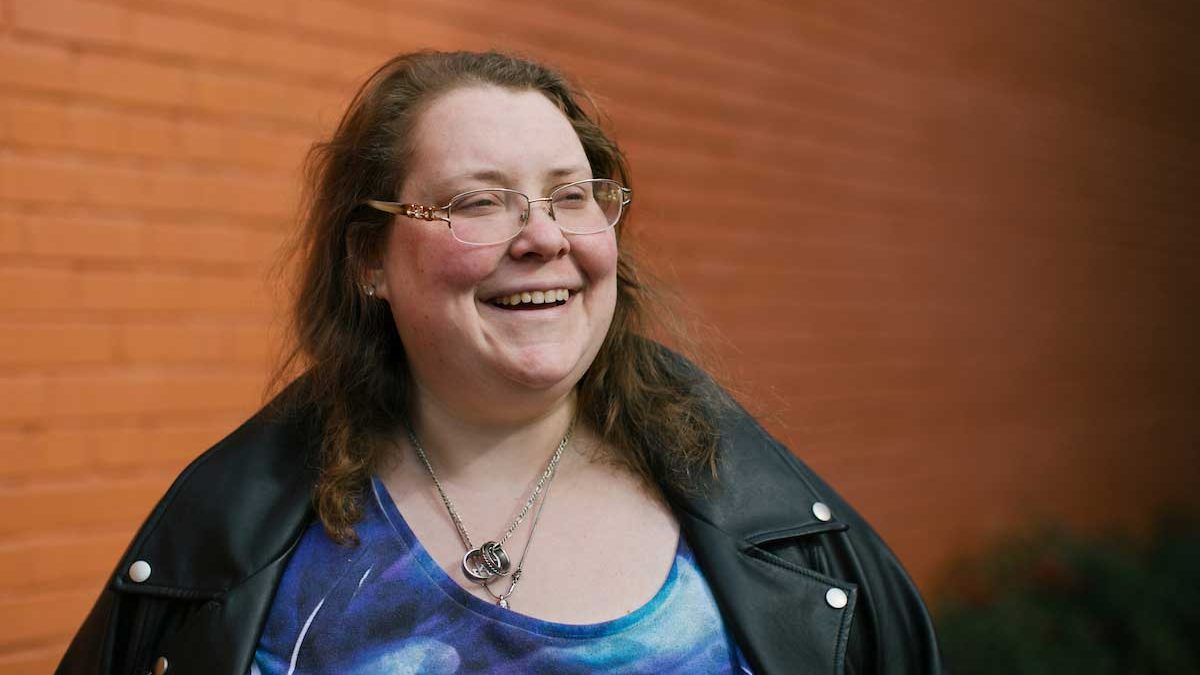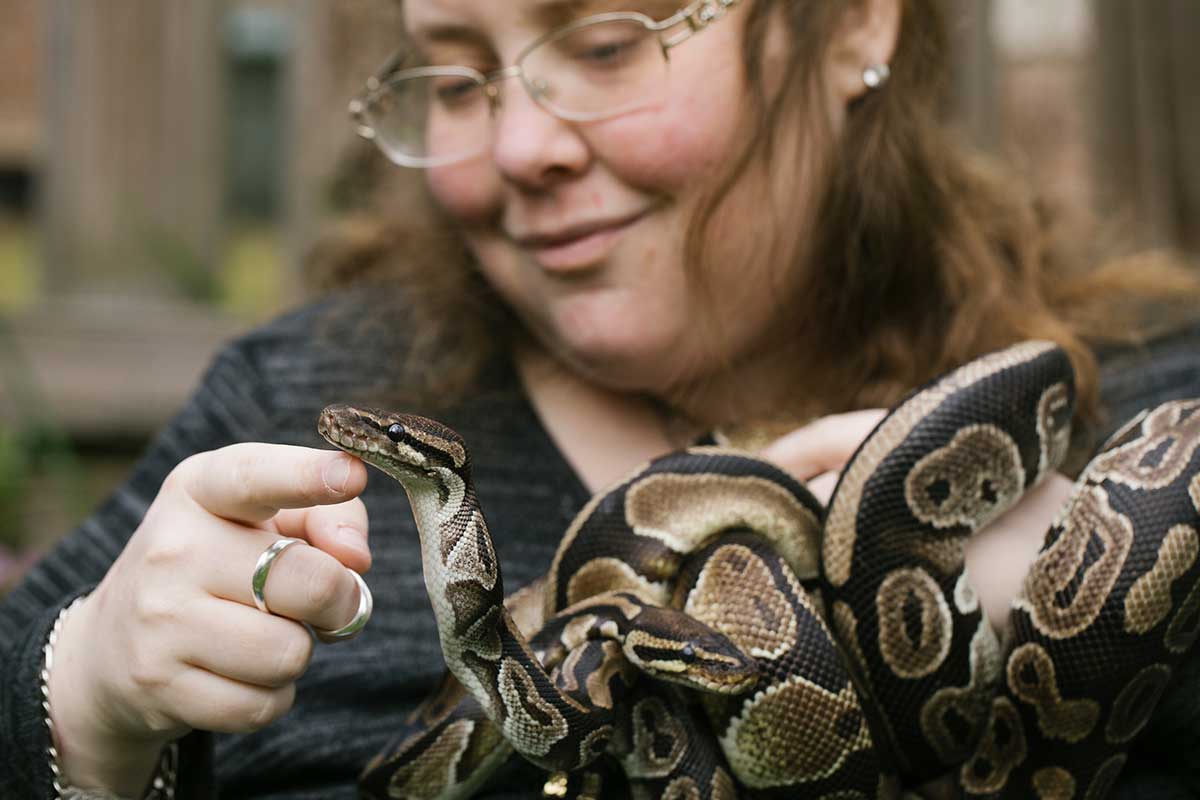Hannah’s perspective
Published on April 21, 2020Hannah Spitzer shares what it’s like to be a college student with high-functioning autism.

Hannah Spitzer shares what it’s like to be a college student with high-functioning autism.
What it’s like to be a college student with high-functioning autism
Hannah Spitzer, who was diagnosed as having autism spectrum disorder when she was 14 years old, hasn’t let anything get in the way of her education. In her second year of study at Meredith College in Raleigh, North Carolina, she fell gravely ill to the point where it affected her ability to continue classes. She was diagnosed with a form of Ehlers-Danlos syndrome, a degenerative disorder that affects the body’s connective tissues. Despite this challenge, Hannah was determined to return to her studies — this time, choosing to pursue a bachelor’s degree in human development and family studies from the UNC School of Education.
For Autism Awareness Month, Hannah shared a little bit of what it’s like, for her, as an adult with high-functioning autism studying at Carolina.
I came here because the University has a wonderful disabilities program and they were willing to work with me going one semester at a time. We had some family friends who pointed us toward all the autism research at UNC, and I’ve always wanted to work with children with autism like me. So, all the autism research kind of drew me here.
I was non-degree-seeking for a good while, but I was lining up to take, perhaps, an education degree. But then the Human Development and Family Studies program opened up, and they sought me out, if I remember correctly, because I had been getting straight A’s in all my education classes. I work very hard each semester to get straight A’s in every class. That’s what I see as my compromise with myself to not feel bad about having to take one class a semester. If I get A’s in those classes, then I’m as good as any other students. If I can get my bachelor’s, I personally would be happy.
I love the classes where I get the chance to do some hands-on work the most, because I don’t get a huge number of opportunities to work with disabled children. One of my classes had us at Camp RoyallOpens in new window, and for a couple of summers I had a wonderful partnership with them — working with children.
 Hannah with her two ball pythons, which are more than just pets. Hannah said spending time
Hannah with her two ball pythons, which are more than just pets. Hannah said spending time
with her snakes is soothing and that she wishes she could register them as therapy animals.
I would say the resources here that have been the most helpful to me are the advisors. They have been really good at helping me.
A lot of the problems I have are things that I don’t think anyone can really help with except myself. But I think, for what the University can do, they’re doing a really good job, and I really appreciate everything. The Friday CenterOpens in new window is amazing. When I was non-degree-seeking, the Friday Center was a great resource for me. They provided much of what my advisors provide now — helping me figure out how to do things like making sure I’m registered, making sure I know what time my classes are, and making sure everything’s cool with the registrar. You know, mainly things that if you have autism — and especially if you’re really shy about making phone calls to places you don’t know — it really helps to have one person who can help advocate for you. I’m grateful that I don’t have to worry about that and can turn to my advisor.
When I’m really overwhelmed, I go to the UNC Learning CenterOpens in new window, and they are amazing for all people —no matter what. The site where you register for an appointment is intuitive, and they even take walk-ins, and the people are so patient and think of things you wouldn’t think about before. Like, I was having huge anxiety over one of my papers. One of my problems is knowing when to use formal writing versus informal writing. It’s one of those things where it’s not enough for you to have just a list of rules, because nothing can cover all of it. Someone at the Learning Center just sat with me and told me to read my paper out loud. He just sat with me and took all the anxiety away from it. Just someone sitting with you — even if you’re doing most of the work — takes a huge amount of the anxiety away, I’ve found.
The Learning Center and my advisor are the resources I use most. I don’t think I’ve had a bad professor yet. I don’t think I’ve ever had one who was unwilling to work with me. And that’s a big part of it, I think, just the environment, the inclusive sort of feel of the University. I’ve never had anyone that wasn’t willing to work with me, wasn’t willing to meet with me, wasn’t willing to have good talks with me, wasn’t willing to just stay after class and chat with me. That’s pretty cool.
I wish there was a little bit more awareness that people with high-functioning autism exist. I think there’s a big misconception about the autism spectrum, and even though it’s clear that it’s a spectrum, it’s never really specified that high-functioning autism is a thing — or what it looks like. I’d like to see more education on what high-functioning autism looks like for other students on campus, for professors and the whole campus community, especially for the people going into education.
If my contributions can help one person, even just one person, then I’ve at least accomplished something in my life.
Hannah hopes to graduate in 2023.
Visit teacch.comOpens in new window to learn more about UNC-Chapel Hill’s services across the lifespan for individuals with autism spectrum disorder or autism.unc.eduOpens in new window to learn more about autism research and the Autism Research Center at Carolina.